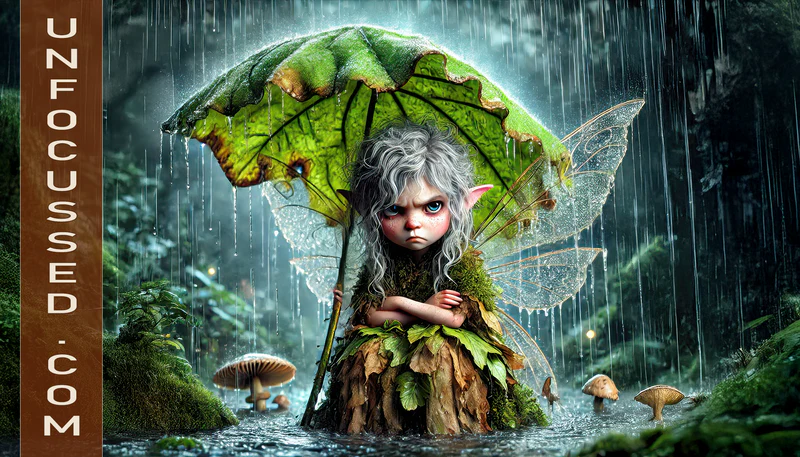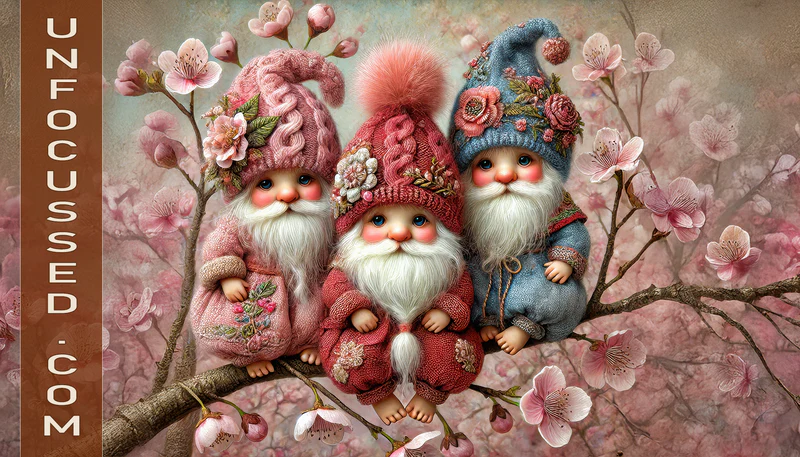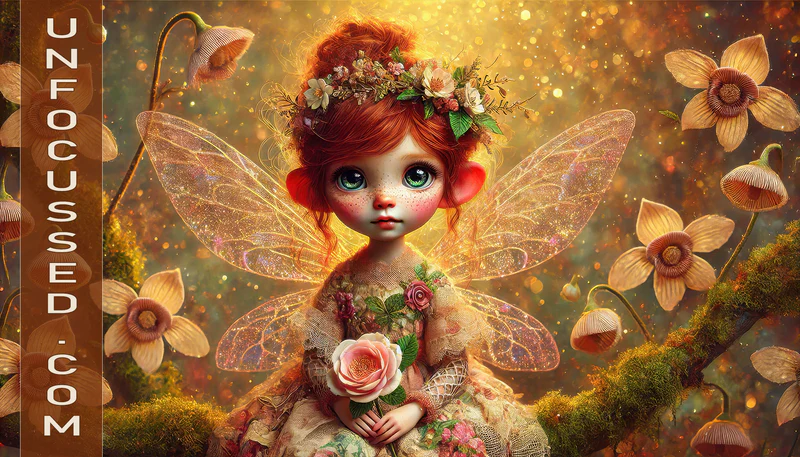
par Bill Tiepelman
Guardian of the Painted Feathers
The Night the Forest Blinked The forest didn’t go dark; it went quiet—the kind of hush that makes even the moths put on slippers. High on a braid of oak limbs, the Guardian of the Painted Feathers opened her eyes, and the night opened with her. Her name—rarely spoken, because respect doesn’t always need syllables—was Seraphine Quill, an owl whose plumage held more color than a market full of unruly scarves. Blues that remembered rain. Ambers with opinions. Petal-pink sighs. She was a woodland guardian with the posture of a librarian and the patience of a saint who drinks espresso. Tonight, the silence had a shape. Something was sipping saturation from the world, the way a bored god might swirl a spoon in the teacup of creation. Seraphine heard it before she saw it: that thin sound, like a violin string tuned to “uh-oh.” She rotated her head in a slow, scandalized arc—owls are basically swivel chairs with talons—and let her gaze travel the understory. The enchanted forest breathed in patterns: fern-ripple, blossom-rustle, fox-sigh, cricket-one-two-three. But beyond the chrysanthemums and the gossiping mushrooms (who, frankly, shouldn’t be trusted with anything you wouldn’t spray with vinegar), a gray smear drifted between the trunks. “Absolutely not,” Seraphine murmured. Her voice was low and velvet and contained enough authority to make a wolf apologize to its shadow. She dropped from the branch and rode a column of cool air, her colorful feathers catching star-light like tiny stained-glass windows. Flowers turned as she passed—flirting, mostly. The peonies were hopeless. She landed near the old root where the forest kept its secrets. A fox emerged, eyes bright with the kind of anxiety only foxes and human poets truly cultivate. “Guardian,” he said, tail doing the nervous metronome. “The color thief is back. I chased it, but it kept… not being.” Seraphine clicked her beak once, which in owl language meant: I believe you; also, hydrate. “You did well, Vesper. Go home. Guard your den and your kits. No heroics. Leave the dramatics to the bird with better eyeliner.” Vesper squinted at her. “Is it weird that I find you reassuring and vaguely terrifying?” “Correct on both counts.” She fluffed her chest and every hue sharpened, like the forest took a breath and remembered its opinions. This was Seraphine’s first gift: nocturnal protector of saturation, conductor of chroma. Where she blinked, colors woke up and behaved like themselves. The gray smear crept closer, as if curious, as if trying on the idea of existing. The air cooled in that specific way that makes you suddenly aware of your knuckles. Where the smear passed, violets turned to etiquette-violating beige. A fern folded its own memo and forgot what it wanted to say. “Name yourself,” Seraphine called, voice ringing against bark and moon. “And if you don’t have a name, darling, that’s your first problem.” No answer. Only that violin-string sound, a whine pitched at the uneasy place behind the eyes. The smear reached for a cluster of late roses, and the petals dulled like old coins. Seraphine stepped forward, one talon at a time, and the roses blushed back to themselves. She wasn’t just blocking the thing; she was repainting the night. From the left came a flutter of chaos: three moths in formalwear, the sort who subscribe to niche magazines. “Guardian!” they chorused. “There’s a leak in the moonlight two clearings over; we are beside ourselves and we do not have enough selves for this.” “Tell the bats to hang tight and practice their vowels,” Seraphine said. “We’ll fix the leak after we plug this vacuum cleaner of gloom.” She turned back to the smear. “I know you,” she said softly. “You’re the Unraveling—entropy with social anxiety.” The smear quivered, then tried to be five inches to the right. Seraphine’s feathers shimmered—turquoise slipping into citrine, aubergine into ember—until the owl art print the world would one day hang on a gallery wall felt like it had been born in that moment. She reached into herself for her second gift, one she used sparingly because it tended to attract myths: the voice that convinced shadows to tell the truth. “Why do you eat color?” she asked. “Speak, little hunger.” It didn’t speak, exactly. It threw images at her: a rain-soaked palette left out overnight; a child’s crayon snapped in an argument with gravity; a blank page that had never been brave. Seraphine tasted the loneliness in it—the awkward, shy ache of things that never learned how to be vibrant without apology. She softened. It’s hard to stay mad when the monster turns out to be a diary that learned to walk. “Listen,” she said, wings mantling. “This forest needs every audacious shade it can muster. Saturation is a promise, not a crime. You can travel with me and learn hunger with manners, or I can put you in a jar labeled ‘Absolutely Not’ and bury you under the sassiest hydrangea in existence. Decide quickly.” The smear hesitated. From the branches above, a chorus of small minds—sparrows, finches, one judgmental wren—leaned in. Even the cicadas stopped crunching their existential chips. In that pause, Seraphine felt the forest teeter, like a teacup on the edge of a desk during an emphatic email. At her feet, the roses tested their own perfume as if to say, We’re rooting for you, dear; don’t make us display our thorns. A breeze crept in, tasting of mint and rumor, and lifted the fringe of Seraphine’s face like a crown considering its options. She took a breath, layered with pine and a whisper of thunder, and began the old work—the art older than art—the dance of keeping things bright. She moved in a slow circle around the smear, talons whispering on bark, voice low. “Repeat after me,” she coaxed. “I am not a void; I am a frame.” Something in the smear steadied. It gathered itself like a shy person in a thrift-store mirror and took on the faintest blush of color, as if courage were a pigment. A faint blue—one that remembered ponds—rippled across its edge. Seraphine nodded, the tilt small and queenly. Frames do not devour paintings; frames insist the painting be seen. Branches creaked above. The old oak—Elder Root, who slept like a landlord—spoke in a voice that sounded like contracts made with rain. “Guardian,” he rumbled, “does your mercy have room for what forgets itself?” “My mercy has room for the chronically uncertain,” Seraphine replied. “If it misbehaves, we’ll try consequences after compassion. That’s the sequence. Otherwise, what are we protecting—color, or dignity?” Elder Root considered, which took a number of centuries and also six seconds. “Proceed.” Seraphine leaned closer to the smear, warm and terrifying as a sunrise with great eyebrows. “Stay,” she commanded. “Learn. You will not sip a single shade without asking. You will send me a polite whisper for anything bolder than taupe. We begin with blues at dawn. The frogs will supervise; they’re bureaucrats at heart.” She lowered her voice. “And if you try nonsense, darling, I will turn you into a tasteful border around a fantasy forest tea menu and serve you chamomile forever.” The smear shivered. Then—miracle with a sheepish grin—it folded. Not gone, not defeated. Simply… outlined. A thin band of slate—now clearly a frame—stayed where it was placed, humming softly like a cat pretending it’s not purring. The air rushed back into itself. Colors sighed and went dramatic, as colors do when they realize they almost became a metaphor for austerity. Across the clearing, the chrysanthemums applauded with the modesty of fireworks. The moth trio lit a celebratory lantern that turned out to be a glowworm with feelings; apologies were made. Vesper the fox returned with a beleaguered vole and a pie made of blackberries and ambition. Someone struck up a cricket jazz standard. For a dangerous minute, the night felt like a party. Seraphine took her place on the branch again, a majestic owl painting made real, her vibrant feather detail pulsing like the heartbeat of the grove. She closed one eye, then the other, letting the scene filter through the wisdom between. The frame waited, obedient and a little proud. The forest breathed, saturated and brave. But peace is not the same as safety. A wind blew from the north—dry, broom-swept, carrying a smell like burnt promises. On the horizon, beyond the hills that wore the moon like a brooch, something rose that wasn’t a storm and wasn’t a mountain. It had architecture. It had ambition. It had lawyers. Seraphine’s claws tightened around the bark until the tree hummed comfort up to her bones. “Oh,” she said to the night, to the framed hunger, to the moths dusting their anxieties with glitter. “It’s one of those nights.” High above, an owl with painted plumage and a timetable of miracles opened both eyes. She lifted her head and let the moonlight show off. If the forest had to face what was coming, it would face it in full color, with extra sass and a hopeful heart. That, after all, is what guardians are for: not to keep the world from changing, but to make sure it changes without losing its palette. And from the north, the first note of the next trouble arrived—long, legal, off-key. The Committee of Acceptable Shades By dawn, Seraphine Quill had already given the smear its first lesson in responsible blueness. It went surprisingly well, once she bribed it with dew. But owls rarely have the luxury of lingering victories. Because by the time the second cricket rehearsal ended and Vesper had passed out from pie-related hubris, the north wind brought with it an entourage. They weren’t storms. They weren’t spirits. They were bureaucrats. Which is to say: worse. A thunder of parchment flapped into the clearing, pages bound by red ribbons, fluttering like the wings of a thousand passive-aggressive butterflies. And from that cyclone of clauses emerged the Committee of Acceptable Shades—tall, gangly silhouettes with clipboards where faces should be. Each clipboard bore a single rectangle of gray: flat, unyielding, and smug. Their leader’s rectangle read “Taupe, Standardized.” “Guardian,” the head figure intoned, its voice like two staplers mating. “You have been operating without a license to distribute vibrancy. All saturation above Pantone 3268-C must be surrendered immediately for recalibration. Non-compliance will result in monochrome sanctions.” The forest gasped. A violet fainted, a sunflower cursed under its breath. Even the glowworm that had been impersonating a lantern dimmed in horror. Seraphine fluffed her feathers until the dawn light ricocheted through her like stained glass at a rave. “Sanctions?” she said, sweet and sharp. “Darling, the only thing you’ll sanction here is your own relevance.” The fox, Vesper, rubbed sleep from his eyes and squinted at the clipboard-faces. “Wait, are those… lawyers?” “Worse,” Seraphine replied. “They’re design consultants.” The Committee advanced, clipboards glowing faintly with the power of overused Helvetica. The leader snapped its ribbon like a whip. “We offer a deal,” it said. “Surrender the unauthorized hues. You may keep beige, cream, and a very modest mint green if used only in moderation. Otherwise, we will strip your spectrum clean.” Seraphine blinked slowly. Owls are masters of the long blink—it’s like sarcasm made visual. “Beige?” she whispered. “Mint in moderation? You walk into my forest—the one I’ve bled starlight to protect—and you dare reduce it to a waiting room wall?” The Committee rustled nervously. One of the lesser silhouettes fumbled its papers and a faint splash of lavender slipped free before being recaptured. Seraphine saw it. The smear-turned-frame saw it. Even the moths saw it, though they pretended to be too sophisticated. She pounced on the slip like a cat in Prada heels. “There it is,” she declared. “Proof! You keep color for yourselves while rationing the rest of us like misers at a confetti party. Don’t preach balance when your clipboards bleed hypocrisy.” Gasps rippled through the undergrowth. The Committee faltered. For the first time, the forest felt the truth: that color rationing wasn’t order; it was theft disguised as neatness. Seraphine turned her back deliberately, tail feathers splayed in a way that screamed majestic defiance. She addressed the crowd of ferns, roses, and startled beetles. “Colors, hear me. They would make you ashamed of being bold. They’d have you believe beige is safer, taupe is respectable, and neon only belongs on karaoke flyers. But you were born audacious. You were painted reckless. This forest is not a cubicle—it is a cathedral. And cathedrals deserve stained glass, not frosted panels of standardized taupe!” The roses cheered with thorns out. The fox howled. Even Elder Root shook his branches, sending down a shower of acorns like emphatic applause. The smear-frame pulsed, a faint ripple of aquamarine sliding across its edge, as if it too wanted to belong. The Committee recoiled. Their clipboards quivered, rectangles of gray rippling with a hint of fear. “This is irregular,” hissed the leader. “We must consult… higher management.” “Do that,” Seraphine said. “But know this: while you file your memos and sharpen your monochrome, my forest will keep its hues. And should you return with chains for color, I’ll repaint your clipboards into rainbows so gaudy, you’ll wish you’d died beige.” The Committee dispersed in a flurry of papers, vanishing into the northern horizon like a bad newsletter. The silence they left behind was fragile, but the forest filled it with cautious song. Petals brightened. Leaves stretched. The smear-frame hummed like a child reciting its first poem. Vesper padded closer, eyes gleaming. “You know they’ll come back, right? With more paperwork. Maybe even PowerPoints.” Seraphine gave a dark, velvety chuckle. “Then we’ll need allies. The brighter, the bolder, the sassier, the better. This fight isn’t just about keeping our colors. It’s about refusing to apologize for them.” She spread her wings, hues exploding across the dawn like a rebellion with feathers. And somewhere beyond the horizon, higher management stirred. The kind of management that didn’t just ration colors—they patented them. The kind that painted skies gray for profit. The kind that, if Seraphine wasn’t careful, would rewrite the forest in grayscale footnotes. The Color Cartel The first rumor arrived on raven wings. Not the polite, note-taking ravens, mind you. These were the sarcastic ones who couldn’t tell a secret without adding commentary. “Guardian,” croaked the lead raven, perching dramatically on Elder Root’s shoulder, “the Color Cartel is mobilizing. They’ve sent cease-and-desist letters to sunsets and threatened to repossess rainbows. One rainbow in particular is suing for emotional damages.” Seraphine narrowed her eyes. “So they’re moving from bullying flowers to bankrupting horizons. How tedious.” She ruffled her feathers, throwing sparks of chartreuse and garnet into the morning air like a fireworks display with opinions. “Tell them we’ll be hosting a festival—of pigments too impossible to patent.” The raven tilted his head. “A festival? You’re going to fight a cartel with… glitter?” “Not glitter,” she said. “Wonder.” The Festival of Impossible Pigments Within days, the forest transformed. Mushrooms glowed with colors they’d been hiding out of shyness. Ferns sprouted leaves edged in hues only bees could name. The foxes painted their tails with ultraviolet streaks visible only to the honest. Vesper strutted like he’d invented confidence. The moths threw a runway show, modeling outfits so dazzling even the cicadas forgot to be obnoxious for five minutes. And then came Seraphine. She took the central perch, feathers flaring into shades no mortal palette had cataloged: the green of laughter echoing in a canyon, the violet of secrets kept under pillows, the gold of forgiveness after a fight. These weren’t colors—they were confessions wearing light. The crowd gasped, cheered, cried, and danced all at once. The festival was not merely a celebration; it was defiance given wings. Naturally, that’s when the Color Cartel showed up. They arrived in uniforms the shade of lawyer breath—a beige so dull it could cancel joy at twenty paces. Their leader, a tall figure in a robe stitched entirely of contracts, stepped forward. Its voice rattled like a stapler in heat. “Cease this unauthorized saturation. Effective immediately. Or we’ll desaturate your forest into compliance.” Seraphine tilted her head, slow and regal. “You’re welcome to try,” she said, her eyes glowing with every shade of defiance. “But understand this: you can’t copyright awe. You can’t trademark wonder. And if you so much as sneeze on a violet, I will personally repaint your robes with hues so bright they’ll burn your retinas into optimism.” The crowd roared. The smear-frame pulsed aquamarine, then emerald, then—miracle of miracles—crimson. It had found its courage at last. The ravens dive-bombed with sarcasm, distracting the Cartel’s enforcers. Foxes stole their staplers. The moth runway show pivoted into a battle catwalk, dazzling the enemy with avant-garde sparkle. Elder Root dropped acorns like meteors. Even the hydrangea got in on it, shouting, “Tasteful border, my petals!” before walloping a Cartel goon with a bouquet. The Last Laugh of the Guardian The battle was loud, ridiculous, and deeply satisfying. Contracts tore. Beige unraveled. The Cartel’s robes faded until they were nothing more than dull shadows too embarrassed to linger. Seraphine soared overhead, every wingbeat painting the sky with a new declaration: Hope is not negotiable. When the dust settled (and the moths finished their encore strut), the forest was brighter than ever. The smear-frame, once ashamed of its hunger, now shimmered proudly at the edge of the clearing—no longer a void, but a window into possibility. It hummed softly, like a promise learning to sing. Seraphine perched on Elder Root again, gazing over her domain. “Well,” she said, smoothing a rebellious feather. “That was fun. Who’s up for pie?” The fox groaned. “Please. No more pie.” The ravens cackled. The flowers blushed. Even the cicadas clapped their wings, though badly off-beat. And in the center of it all, Seraphine, Guardian of the Painted Feathers, closed her eyes. For tonight, the colors were safe. Tomorrow, bureaucracy might return. But she’d be ready—with sass, with feathers, and with a hope too radiant to ration. Because guardians don’t just protect. They remind the world to stay audacious. Epilogue They say if you wander deep into that forest on a moonlit night, you’ll see her: an owl shimmering with impossible hues, watching with eyes that could outwit empires. If you’re lucky, she’ll wink. If you’re unlucky, she’ll assign you to hydrangea duty. Either way, you’ll leave brighter than you came. Bring the Guardian Home The legend of Seraphine, the Guardian of the Painted Feathers, doesn’t have to live only in story. Her brilliant hues and defiant spirit can brighten your own space, wrapping your world in the same audacity she gifted the forest. Imagine her gaze watching over your home, her plumage spilling color into your days—a reminder that hope and sass are always worth protecting. Choose how you’d like to welcome her: Framed Print — perfect for gallery walls or living spaces that crave bold energy. Canvas Print — a textured, painterly feel that makes the Guardian’s feathers look alive. Tote Bag — carry the Guardian with you as a daily protector of both your belongings and your style. Fleece Blanket — curl up under her wings of impossible color and warmth. Greeting Card — share the Guardian’s hope and humor with friends who could use a reminder to stay bold. Whichever form you choose, the Guardian is ready to perch in your world, infusing it with the same defiant beauty she used to save her forest. Bring her home, and let every glance remind you that your colors deserve to shine.






























